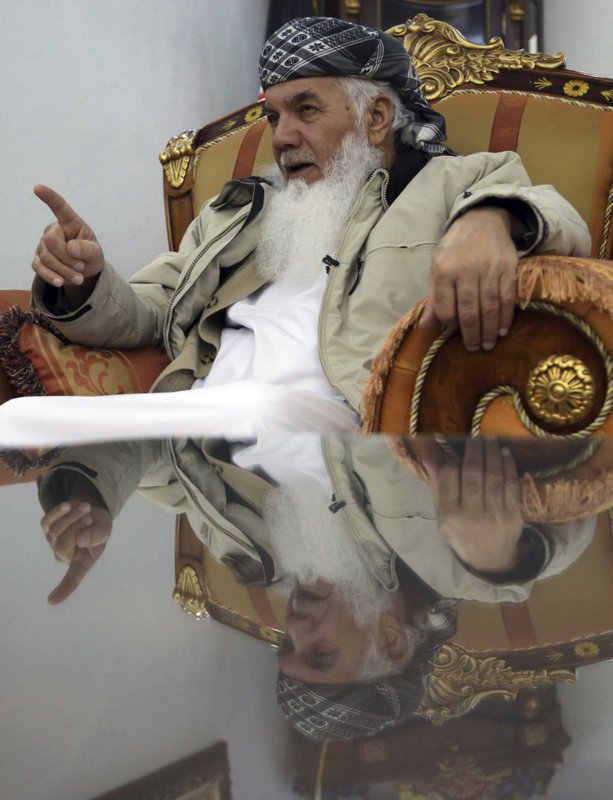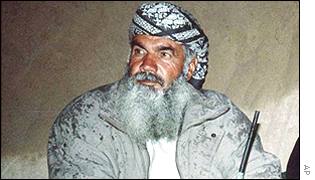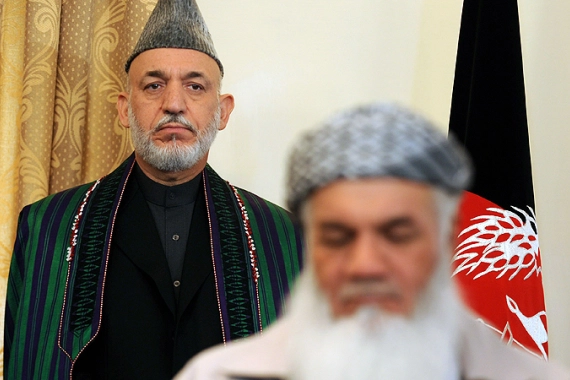Kevin J. Tracy
FOR IMMEDIATE RELEASE
2021-08-13
Bewildered Again by the Legendary Ismail Khan
 Ever since I first learned about Ismail Khan when I was an Air Force Intelligence Analyst, I’ve always had the utmost respect and admiration for him. An Afghan warlord before the NATO invasion of Afghanistan, Ismail Khan leveraged his influence (and militia) to political power in the rebuilt, democratic Afghanistan. When President Biden announced he was withdrawing all US troops, damned the consequences, the 75-year-old former warlord reformed his militia and vowed to keep the Taliban out of Herat at all costs. At 75, and almost 20 years after giving up being a warlord to become a politician, I was skeptical he could actually lead any kind of organized resistance against the Taliban. To Ismail Khan’s credit, Herat was one of the last provinces to fall and the location of the fiercest resistance to the Taliban advance (to date, likely only rivaled by Kabul).
Ever since I first learned about Ismail Khan when I was an Air Force Intelligence Analyst, I’ve always had the utmost respect and admiration for him. An Afghan warlord before the NATO invasion of Afghanistan, Ismail Khan leveraged his influence (and militia) to political power in the rebuilt, democratic Afghanistan. When President Biden announced he was withdrawing all US troops, damned the consequences, the 75-year-old former warlord reformed his militia and vowed to keep the Taliban out of Herat at all costs. At 75, and almost 20 years after giving up being a warlord to become a politician, I was skeptical he could actually lead any kind of organized resistance against the Taliban. To Ismail Khan’s credit, Herat was one of the last provinces to fall and the location of the fiercest resistance to the Taliban advance (to date, likely only rivaled by Kabul).
As you might have guessed, I’m a fan of Ismail Khan. Men like him are exceptionally rare in this day and age and they can only be produced in the few bastions of truly politically unstable countries like Afghanistan.
Ismail Khan’s story dates back to the late 1970s when he was a Captain in the National Afghan Army. In 1979, a protest against the Communist Khaliq government had started outside the governor’s palace in Herat. When the governor ordered his soldiers to shoot down the protesters, Ismail Khan led a successful mutiny within his garrison. The Afghan soldiers began distributing firearms to insurgents and the legend of Ismail Khan began. It was the beginning of the organized resistance to the Soviet puppet regime and communist presence in Afghanistan.
The communist government responded to the Herat Uprising by using Soviet bombers to level Herat, killing over 25,000 of its own citizens in less than a week. Yet, despite the bombardment and his active in fighting the forces loyal to the communist government, Ismail Khan survived. He would then travel to the rural parts of Herat and begin assembling a militia with amazing success. Throughout the war against the communists, he earned the reputation of a capable fighter, enlightened commander, and skilled politician.
When the resistance finally captured Herat in 1992, Ismail Khan was instantly named its governor. As governor of Herat, Ismail Khan found himself in combat yet again, this time against the Taliban in 1995. Ismail Khan, a deeply devout Muslim and arguably an Islamist, actually didn’t have too many qualms with Taliban ideology. The inhumane, horrifying actions of the Taliban are probably what he despised. He successfully defended Herat City and Province from the Taliban and pushed back their advance and began a counter attack against the Taliban’s stronghold in Kandahar. It wasn’t until an Uzbek military commander switched sides and betrayed him and the Afghan military without warning that he suffered a devastating loss. Yet, amazingly, Ismail Khan and much of his army were able to survive and flee into Iran, and survive in Iran.
 Not to be stopped, Ismail Khan returned to Afghanistan in 1997 and began organizing a new armed resistance to the Taliban. However, he was betrayed by another Uzbek military commander who defected to the Taliban and captured Ismail Khan.
Not to be stopped, Ismail Khan returned to Afghanistan in 1997 and began organizing a new armed resistance to the Taliban. However, he was betrayed by another Uzbek military commander who defected to the Taliban and captured Ismail Khan.
Yet, the Taliban; which is most famous for its brutality; spared Ismail Khan a public execution and opted instead to imprison the rebel leader. Perhaps the Taliban feared a wider revolt in Herat Province if they executed Ismail Khan. Perhaps Ismail Khan’s devout faith is what saved him. Whatever the reason, Ismail Khan was sent to jail and survived again.
However, Ismail Khan isn’t the type of man who would be content sitting in a prison! In 1999, he escaped the prison, and survived, and then continued fighting the Taliban as part of the Northern Alliance… and still he survived.
After the Northern Alliance helped the United States to topple the Taliban in the aftermath of the September 11, 2001 terrorist attacks, Ismail Khan was returned to his former position as governor of Herat province.
Now, as Governor of Herat, Ismail Khan proved to be a bit of a problem for the United States and the government of Afghanistan. Essentially, Ismail Khan treated Herat as its own country. He conducted foreign policy directly with Iran, Turkmenistan, Tajikstan, and other countries; directly paid government employees; provided social welfare; made enormous investments in infrastructure; refused to pass the tariffs he collected from international trade along to Kabul; and maintained his own military. As time went on, he began expanding his influence into neighboring provinces and the neighboring warlords in those provinces began getting very, very annoyed.
Those neighboring warlords and provinces found a sympathetic ear in Kabul; which wanted the money owed to them by Herat Province. When ensued was chaos and nobody really knows what happened. A few military commanders in Herat attempted to assassinate Ismail Khan, but failed and Ismail Khan survived yet again. An enormous conflict was about to erupt with several smaller warlords looking to exploit the situation. Hamid Kharzai sent troops to prevent the situation from escalating. Then, one of the commanders in the Afghan National Army sent by Karzai actually assassinated Ismail Khan’s son and the national Minister of Civil Aviation, Mirwais Sadiq. The commander said it was self defense, Karzai said it was “a small accident,” and everyone expected Ismail Khan to erupt in a flurry of anger and rage not seen since US Marines first landed in Afghanistan to retaliate for what happened in New York and Washington.
 But that isn’t what happened.
But that isn’t what happened.
Despite the assassination of his son and the disordered state of the Afghan military sent to contain him, Ismail Khan resigned as governor, went to Kabul, and joined the Karzai administration as the Minister of Energy and Water. Had Ismail Khan fought back, he likely knew he would eventually be killed in an American airstrike and decided to immediately deescalate the situation instead. Ismail Khan survived.
As the Minister of Energy and Water, Ismail Khan became a target of the Taliban yet again. In 2009, a suicide bomber detonated his device while Ismail Khan was traveling to the airport. The explosion murdered four of Ismail Khan’s bodyguards, but Ismail Khan himself miraculously survived.
In 2012, as the Obama administration began pulling troops out of Afghanistan, Ismail Khan was accused by his political rivals of smuggling weapons to his supporters in and near Herat province. The accusations came immediately after Khan told his supporters to prepare to fight the Taliban; essentially bypassing the Afghan National Army. In his defense, the Afghan National Army was as incapable then as it is now. Additionally, if the Afghan government had to deploy troops to defend either Herat or Kabul, they would defend Kabul. Herat’s best defense against the Taliban was Ismail Khan and his supporters. The call to arms was legitimate, but I doubted Ismail Khan was smuggling arms. I didn’t doubt that Ismail Khan would smuggle arms to his supporters, but only that he would have the means and access to smuggle arms to his supporters. I don’t believe he was ever convicted of any crime, but he was eventually removed from office (peacefully) less than a year later.
When President Biden announced it was withdrawing troops on September 11, 2021 (a slap in the face of every veteran who served in the conflict), Ismail Khan leaped into action. Despite being 75 years old, he vowed to defend Herat. His loyal militia rejoined him and, with the help of the Afghan National Army, defended Herat as best as he could. As the Afghan National Army folded yet again, Ismail Khan and his supporters were overwhelmed. Ismail Khan and his surviving men attempted to escape by helicopter, but were captured by the Taliban.
The same Taliban that Ismail Khan might have wiped out if not for betrayal in 1995.
The same Taliban that Ismail Khan rebelled against in 1997.
The same Taliban that Ismail Khan escaped from in 1999.
The same Taliban that Ismail Khan helped to overthrow in 2001.
The same Taliban that Ismail Khan harassed and oppressed as Governor until 2004.
The same Taliban that tried to assassinate Ismail Khan in 2009.
The same Taliban that Ismail Khan vowed to fight in 2012.
The same Taliban that Ismail Khan fought to the last man in 2021.
The same Taliban that has mercilessly killed its opponents in every Provincial capital they’ve captured in their blitz across Afghanistan.
When I heard the Taliban captured Ismail Khan, I feared the worst. Surely, they would kill this legendary Herati man in the most spectacular and horrific way imaginable (and the Taliban have some sick imaginations). However, I clearly have underestimated Ismail Khan.
Ismail Khan pleaded for the war to stop and joined the Taliban.
Ismail Khan survived. Again.
Somehow.







